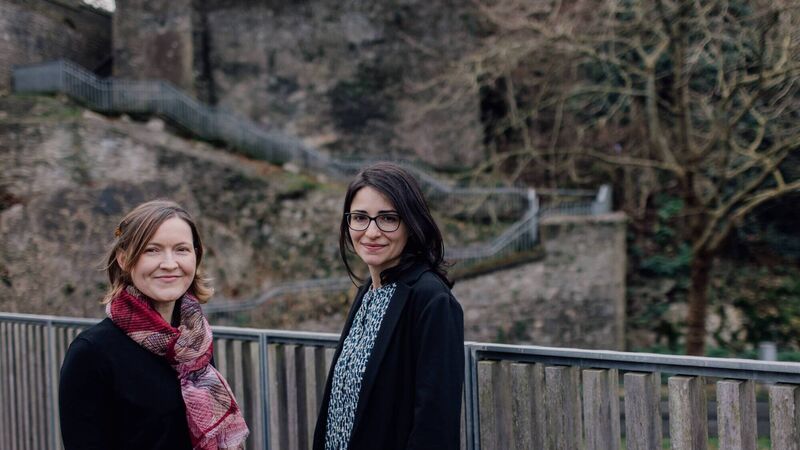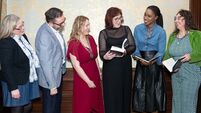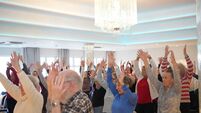Meet the Cork academics researching the power of child and female activists

Dr Chiara Bonfiglioli and Dr Aoife Daly were awarded €1.985m and €1.998m respectively from the ERC Consolidator Grants for their projects.
TWO UCC academics have been awarded nearly €4m in funding from the European Research Council to carry out in-depth work with a team over the next five years exploring the roles of children and women as activists.
The funding is part of the EU’s Horizon Europe programme and aims to facilitate academics to pursue their most promising ideas.
Dr Daly is a law lecturer specialising in human rights law. Her research focuses on human rights-based approaches and children’s rights in areas including environmental rights, climate activism and access to justice.
“The climate crisis threatens our futures,” says Aoife. “Many children are not accepting this and are instead working together globally to change government inaction. It is extraordinary to see children taking cases not just in national courts but at United Nations (UN) level.
“Children and youth have often been involved in social change, from fighting apartheid in South Africa to Malala Yousafzai’s campaign for girls’ education in Pakistan.
“With climate activism, they are organising on a global scale. It is incredibly exciting to conduct research on what the consequences of this could be for international human rights law, and societies more broadly.
“This project seeks to make leaps in what we know and understand about children’s rights, the ability of children to claim their own rights as well as their ability to change the world.”
Are children angry about the way the climate crisis is being handled?
“I think there is anger mixed in with hope and there’s also confusion as to why adults can’t just get it together and stop the climate crisis getting to a situation where the world is tipped over to catastrophic events.”
Climate campaigner Greta Thunberg and 15 other young people including children put together a petition on the climate crisis which they sent to the UN. One of them, 17-year-old Carl Smith of the Yupiaq tribe in Alaska, pointed out that the warming temperatures are making hunting and fishing more difficult for his people. For example, last year, Carl’s family did not catch any caribou (reindeer). These only pass by the Yupiaq hunting region from November to December each year.
Carl explained that the river must freeze solid in order for the hunter to access their hunting grounds. But last year, it wasn’t cold enough to freeze the river in time.
“We used to go on the river and set fish nets and fish traps,” says Carl. Now, with the river no longer freezing solid, fishing has become dangerous and sometimes tribe members fall through the thin ice and die.
Carl’s mother said: “Usually we are good to travel on the river through to the end of April, the beginning of May. But last winter, we had five people fall through the ice and two didn’t survive. You can’t go up and fish during the fall and winter time because the ice is thin.”

Children as young as eight from Portugal, reacting to the wildfires in that country in 2017 in which 66 people died, brought a petition to the European Court of Human Rights.
“The children and adolescents got together with a lawyer from Portugal and a UK-based human rights organisation.”
Aoife’s project is looking at that kind of activism and what it’s like to be an eight-year- old engaging in that kind of experience.
“It’s part of a very wide-ranging project. The project will examine the kind of judgements that come out of this as children take on (cases). It will look at their roles with their lawyers, how much input they have. And the research will look at the community work of children and youth around the world. It’s not all about the courts, although the court stuff is very exciting and new.”
Aoife adds that, as an academic working in the area of children’s rights, she is interested in how the law has to change to accommodate children.
“Also, it’s about making sure that children have an okay experience and that the lawyers are working ethically.”
The arts will also be used to further enhance the community exercise.
“Whether through painting, photography or drama, the arts will allow children to be creative and to bring their messages to my team. We’ll have a website where their artwork will be displayed. We’ll talk to children and youth about whether they want to go to local or national politicians, or the UN.”
Aoife says she envisages working with children in Cork in the course of her research.
On the question of children dealing with difficult issues such as the climate crisis, Aoife says that ideally, “we would like to protect them entirely from these issues. But the fact of the matter is that children are often, on their own, very aware of what the problems are. That was sparked by Greta Thunberg in a global and self-led way.”
Women’s and gender studies lecturer, Dr Chiara Bonfiglioli’s WO-NAM project will analyse women’s participation in the Non-Aligned Movement during the Cold War.
“The Non-Aligned Movement was created in 1961 as an alliance between socialist Yugoslavia and newly decolonised states in the Global South,” says Chiara. The idea was that smaller countries would have the same rights as the international power blocks; the Western block and the Soviet block.
“WO-NAM will provide crucial insights into the history of women’s participation in the Non-Aligned Movement during the Cold War era, studying the roles of female leaders, women’s movements and women’s organisations.
“Bringing together women’s and gender history, global history and intellectual history, the project will draw on rich and diverse archival collections on women’s activism in its focus on the case studies of Yugoslavia, Egypt, Tunisia, India and Cuba.
In taking Non-Aligned women’s networks as its vantage point, WO-NAM will be the first project to address how female leaders and activists from the Global East and Global South intervened in a variety of international institutions that were part of, or affiliated to, the UN, in order to shape ongoing debates on women’s rights, family planning and development.”
Chiara will be moving back to her native Italy in the autumn, taking the project with her and working from the University of Venice.
“My research will be about female politicians and female activists that were part of the Non-Aligned Movement. During the Cold War, there was big competition between the West and the East; about which system was better equipped to emancipate women.”
Chiara has identified a number of archives and personal collections of women who were active in politics during the Cold War. They have never before being examined.
“What I can see already and what needs to be investigated is that the women were all connected to each other and were informed about the different countries’ policies. They were trying to implement certain policies, especially what was called family planning, or reproductive rights. Many of them were affiliated to an organisation called The National Planned Parenthood Federation. They created their own family planning branches in their own countries.
“In Yugoslavia in 1974, the right to freely decide how many children to give birth to was included in the Constitution. So you had the right to contraception. Abortion was decriminalised from the late 1960s in Yugoslavia.
“On the one hand, they had, on paper, very advanced policies on family planning. On the other hand, abortion was the main method of birth control because contraception was hard to get. Women had many abortions over the course of their lives.
“In places like India, the whole debate on population control went too far. There were a number of sterilisation policies that were not voluntary and had western support. That was because, at that point in the Cold War, there was a big panic about the Third World having too many children.”
Controlling Third World birth rates was, says Chiara, “a neo-colonial racist policy. So there are a lot of elements in the research.
Will the research findings surprise people?
“I hope so. In the West, we tend to think of a number of countries in the Global South and East in terms of women being victimised, not having agency at political level.
“There are still a lot of patriarchal gender norms but there’s also women who were feminists and socialists and organisations of women that did a lot of work during the Cold War.”







 App?
App?


